Index
This topic area covers statistics and information relating to Hull’s Early Help and Prevention Programme including local strategic need and service provision. Further information relating to Schools, Education and Qualifications is given under Health and Wellbeing Influences. Information relating to Children with Special Educational Needs or Disabilities is under Health Factors under Children and Young Children. Further information on early help in relation to mental health and emotional wellbeing is given in Mental Health and Emotional Wellbeing Among Children and Young People under Health Factors within Children and Young People. Further information relating to domestic abuse is given within Domestic Abuse under Health and Wellbeing Influences.
Further details are available in the Hull Early Help Service Guide and Performance Review 2021/22.
Headlines
- Every child deserves the best possible start in life and the support that enables them to fulfil their potential. Children develop quickly in the early years and a child’s experiences between birth and age five have a major impact on their future life chances.
- The majority of children in Hull lead happy and healthy lives, are part of loving families who take good care of them and support them to reach their potential. All children in Hull deserve the best possible start in life but unfortunately there are some who face disadvantages that affect their development, which impacts on their future potential, health and happiness. Providing ‘Early Help’ plays a vital part in offering these children and their families the support they need to reach their potential and keep them safe.
- In 2021/22, there were 5,348 referrals for Early Help services (across all ages not just early years). The most common reason for referral was related to parenting issues (29%), family dysfunction (13%), family in acute distress (12%), child with disability or complex needs (10%), abuse (9%), domestic abuse (5%) and young people’s mental or emotional health (5%).
The Population Affected – Why Is It Important?
Every child deserves the best possible start in life and the support that enables them to fulfil their potential. Children develop quickly in the early years and a child’s experiences between birth and age five have a major impact on their future life chances. A secure and happy childhood is important in its own right. Good parenting and high quality early learning together provide the foundation children need to make the most of their abilities and talents as they grow up.
The majority of children in Hull lead happy and healthy lives, are part of loving families who take good care of them and support them to reach their potential. All children in Hull deserve the best possible start in life but unfortunately there are some who face disadvantages that affect their development, which impacts on their future potential, health and happiness. Providing ‘Early Help’ plays a vital part in offering these children and their families the support they need to reach their potential and keep them safe.
Marmot in his strategic review of health inequalities in England post-2010 stated that parents are the most important ‘educators’ of their children for both cognitive and non-cognitive skills. He also stated that parental involvement in their child’s reading has been found to be the most important determinant of language and emergent literacy.
Literacy is the combination of reading, writing, speaking and listening skills we all need to fulfil our potential. These life skills are essential to the happiness, health and wealth of individuals and society. Fourteen percent of children and young people in lower income homes rarely or never read their books for pleasure. One in five parents easily find the opportunity to read to their children, with the rest struggling to read to their children due to fatigue and busy lifestyles.
Analysis of data from the Millennium Cohort Study suggests that parents who combine high levels of parental warmth with high levels of supervision are more likely to have children at age five who are more confident, autonomous and empathic. On the other hand, a ‘disengaged’ parenting style is associated with poorer outcomes for children in terms of qualifications, relationship problems, unemployment and becoming teenage parents.
As well as good home learning environment, early years’ education is very important. The original Sure Start Children’s Centres programme was based on evidence that effective early intervention prevented costs to society later on. Locally-led community-based programmes can engage those families who might not otherwise seek help. Pre-school shows a significant positive effect on early cognitive outcomes for all levels of quality and duration compared to none. Furthermore, having long pre-school experience has greater benefit on literacy outcomes, whatever the quality, although long good quality pre-school had the greatest effects on early outcomes and at age 11 (test scores and social and behavioural outcomes).
Ensuring children are ready for school and can achieve good levels of education is essential for them to achieve well-paid satisfying regular employment, increase resilience, and improve health and wellbeing. Children living in more deprived areas are more likely to grow up thinking that poverty, poor housing, and unemployment are the norm, which could result in cyclic behaviours with these children behaving as their parents do as they reach adulthood. Early intervention in childhood can help reduce physical and mental health problems and prevent social dysfunction being passed from one generation to the next.
Following the Children and Families Act 2014, children and young people (under the age of 25 years) who have special educational needs may have an Education, Health and Care (EHC) plan, developed by all professionals and the family working together, to address all needs that a child or young person has within education, health and care.
The national definition of Early Help is: “The total support that improves a family’s resilience and outcomes, or reduces the chance of a problem getting worse”. As the national definition says, effective Early Help services can prevent problems from occurring and can tackle them head on when they do, before problems get worse. It also helps to build resilience in families, developing strength and skills that prepare children for adult life and help families to cope better with the challenges life throws at them.
The Hull Picture
Early Help Referrals
Across Hull over all child age groups, there were 5,348 referrals for Early Help in 2021/22. The most common reason for referral was related to parenting issues (29%), family dysfunction (13%), family in acute distress (12%), child with disability or complex needs (10%), abuse (9%), domestic abuse (5%) and young people’s mental or emotional health (5%).
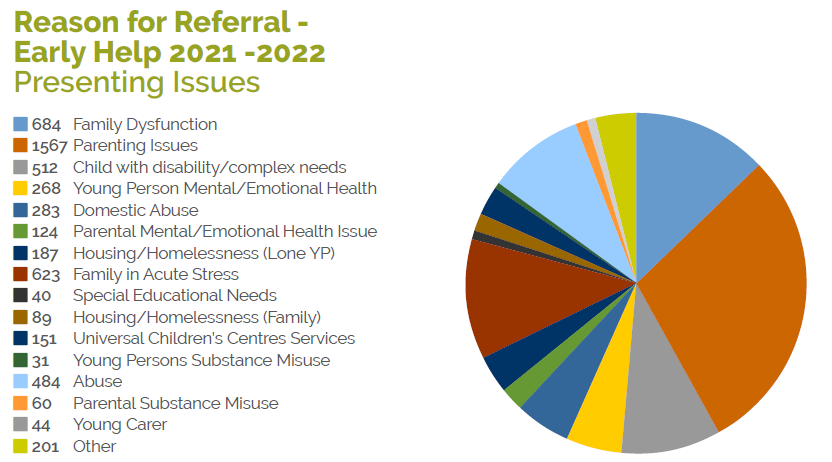
In 2021/22, the following occurred through the Early Help programme:
- Early Help assessments completed on 1,865 people (702 adults and 1,163 children).
- There were 72,397 children and young people (to age 25 years) registered across Early Help.
- There were 1,041 transitions from Children’s Social Care.
The highest number of referrals into Early Help were from schools (23%), self-referrals (12%), from police (10%), and from the primary health service (9%).
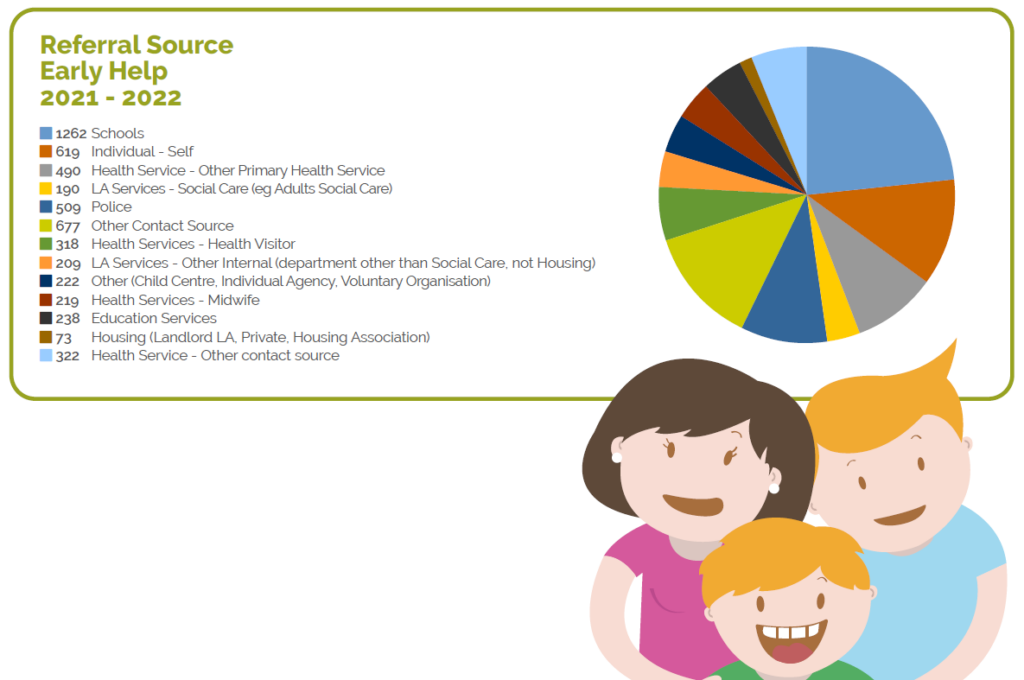
Early Help Training
All staff across the partnership are able to access the Outcomes Star training, which is offered to support assessment of families’ needs. The Family Star Plus covers ten areas of parenting essential to enabling children to thrive, in line with the UK Government’s Supporting Families Program. Other stars which are also covered in the training are the
My Star, Relationship Star, Attention Star, Parent and Baby Star and Homelessness Star. Over the last year we trained 62 number of people, both internally and across the partnership using the Outcomes Star with families.
Reducing Parental Conflict
In 2021/22, 275 professionals across the Early Help partnership attended the Reducing Parental Conflict launch events with 248 completing the training. A total of eight Reducing Parental Conflict Champions were trained who have delivered Reducing Parental Conflict Refresh training to 48 family support practitioners. The Reducing Parental Conflict refresh update webinar was attended by 61 people.
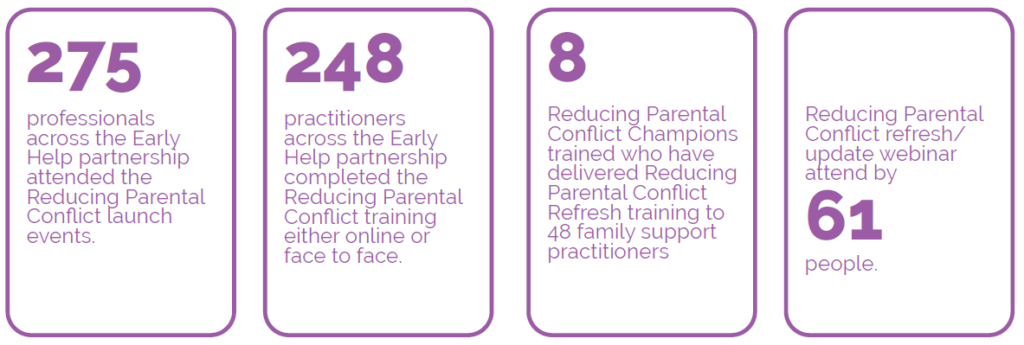
Domestic Abuse Awareness Training
In 2021/22, 47 practitioners attended Amity Relationship Solutions briefings to understand what child to parent violence and abuse is, how to address with the family and some interventions that can be used with the parents/ child. Furthermore, 1,349 people logged on to the Domestic Abuse learning webinar of Ryan & Luke’s story and the Mockingbird play. The aim of the event was to increase practitioner’s knowledge of domestic abuse and the impact on individuals, children, and families.
Improving Emotional and Mental Health and Wellbeing: Hull Thrive
A range of training and support is available through our www.howareyoufeeling.org.uk website which supports children and young people’s emotional and mental health.
The training programme is available to all professionals who work with Young People and Families. It is designed to embed emotional wellbeing as ‘everyone’s business’ with individuals taking on varied roles to build an overall framework of support. Courses are available to book on the website.
Supporting Positive and Enriching Activities
In 2021/22, StreetGames and partners delivered 42 workshops with 549 attendances. There were 22 StreetGames physical activity, behaviour and mental health workshops with 232 attendances and 18 food, Special Educational Needs and Disabilities (SEND) and wider support workshops with 317 attendees. Of the attendees – 57% men and 43% women with 34% of learners aged between 16 and 21. Training is an integral part of Hull’s Healthy Holidays programme.
Family Star
The Family Star Plus covers ten areas of parenting essential to enabling children to thrive, in line with the UK Government’s Troubled Families initiative:
- Physical health
- Your well-being
- Meeting emotional needs
- Keeping your children safe
- Social networks
- Education and learning
- Boundaries and behaviour
- Family routine
- Home and money
- Progress to work
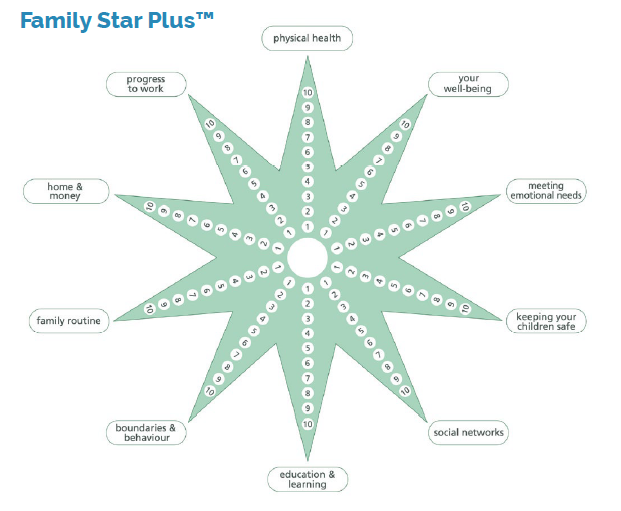
In 2021/22, there have been 327 child level assessments completed for both initial and final outcome stars over the last 12 months.
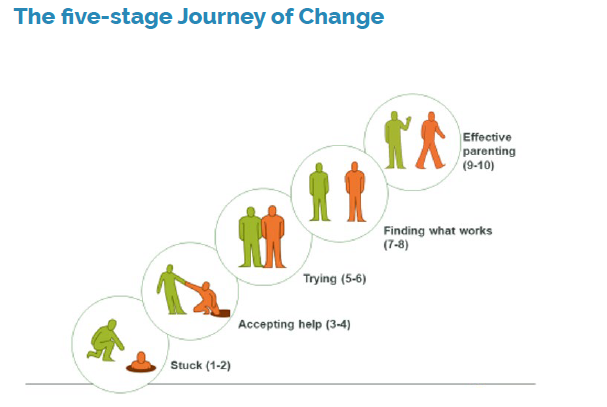
The following chart illustrates the outcomes of children who had a family star undertaken with them in 2021/22. The scores improved for all 10 outcomes but improved the most for wellbeing, meeting emotional needs, and boundaries and behaviour.
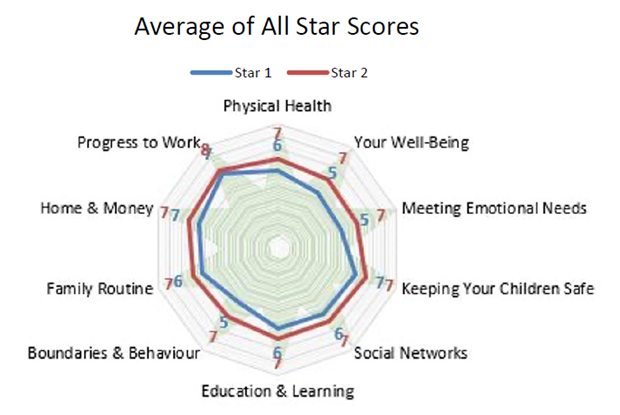
Family Hubs
Family Hubs (previously Early Help Children’s Centres) are a core part of the Early Help Delivery Model across Hull. There are 12 Family Hubs across the city further information on the facilities at each Family Hub is available on www.familyhubshull.org.uk).
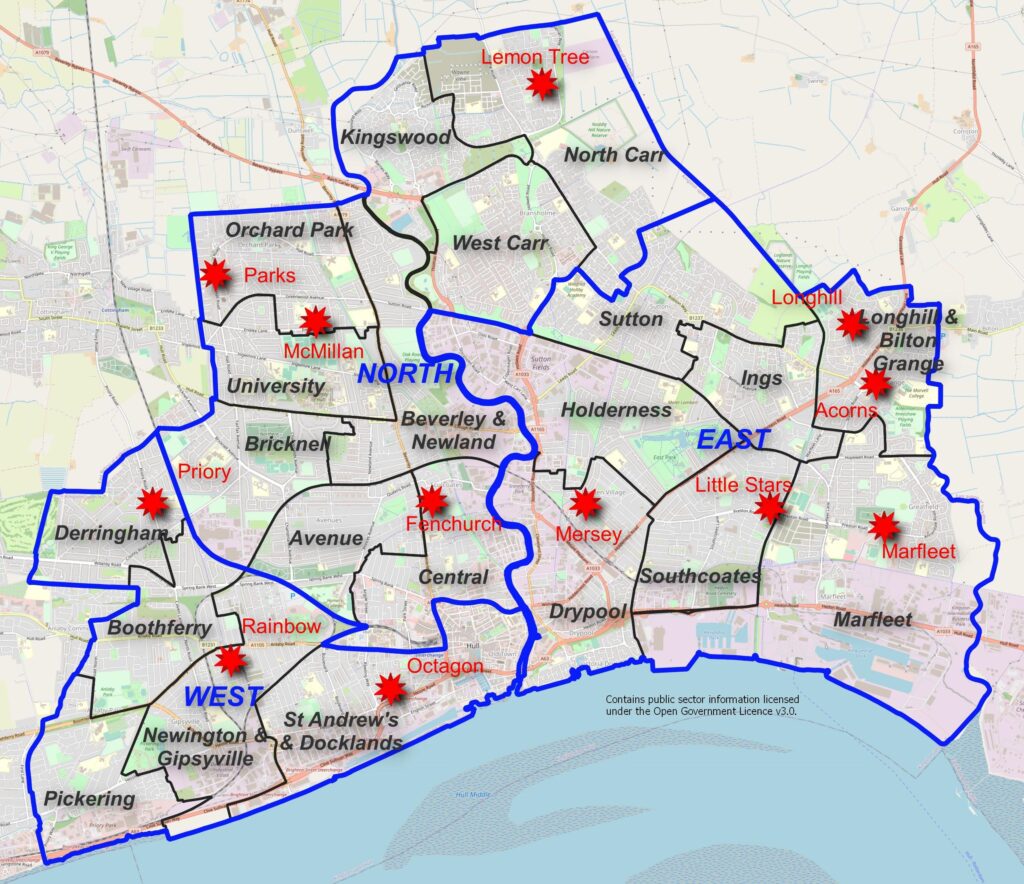
The 12 centres provide a base for bringing together a range of practitioners supporting close collaboration and alignment of services to form an Early Help Team. All staff work with partners across the locality to deliver an integrated approach to
a range of Early Help services. Early Help work in the Family Hub locations delivering sessions that support children’s learning and development. This means planning to meet the educational programmes from the Early Years Foundation Stage (EYFS) which outlines what children ages 0-5 years should be learning.
Targeted Pregnancy Support
Targeted Pregnancy Support (TPS) is an Early Help service aimed at supporting vulnerable people/families during pregnancy. In 2021/22, 243 unborn have been supported and 312 parents have been supported.
Healthy Lifestyles Team
The team aims to encourage positive lifestyle behaviours amongst Hull’s youngest families at the earliest opportunity. Focus is given to five key areas of work:
- Early Years Physical Activity
- Food/Nutrition/Cooking skills
- Pre and Post-Natal physical activity and emotional wellbeing (Us Mums Hull)
- Holiday Food and Activity (HAF) programme (Healthy Holidays Hull)
- Training and Professional Development
More information on the Healthy Holidays Hull in the Annual Report 2021-22 available at https://www.healthyholidayshull.org/review-2021/22
The HENRY programme explores family routine, behaviour, parental styles and physical activity. Over 70 hours of HENRY delivery took place across 2021-22 and for the first time the programme was used as part of the Active Start childhood weight management pilot, supporting families through the National Childhood Measurement Programme (NCMP).
During 2021-22 the Healthy Lifestyles Team launched the HENRY Eat Well for Less parenting workshop to support families with children predominantly aged 5-11 identified as overweight / at risk of obesity through the Active Start (NCMP) programme. Workshop delivery consisted of 2 x 1 hour workshops for the first time, building on existing HENRY programme delivery.
The Healthy Lifestyles Team also provide a programme of early years physical activity opportunities across local communities to support physical literacy, social interaction, school readiness, meeting physical activity recommended levels, and parent / child interaction.
Early Help Special Educational Needs and Disabilities Family Support
From April 2021 to April 2022, 170 children received support through the Early Help Special Educational Needs and Disabilities (SEND) Family Support team.
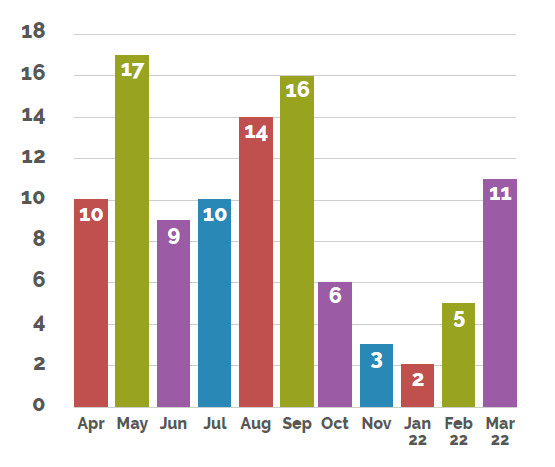
Senior Early Help Family Support Workers (Parenting)
The Parenting Team mainly work with parent/carers to support them in managing children’s behaviour using positive parenting strategies which can help to improve family relationships, family routines, children’s physical safety, children’s emotional wellbeing, co-parenting and parenting conflict.
The Team deliver face to face evidence based group courses, online group sessions and 1-1 support pre and post course if appropriate. Parents also report their own emotional wellbeing and self-confidence improves further to completing a course.
During 2021/22, a total of 1,567 children were in contact for Early Help support where the presenting issue was parenting, with 451 families receiving a triage to determine the most appropriate intervention. There were 226 parent / carers assigned for a 1-1 or pre-course work. The service was involved with 185 families where the children referred were aged 0-11 years and 231 families where the children referred were aged 12-18 years.
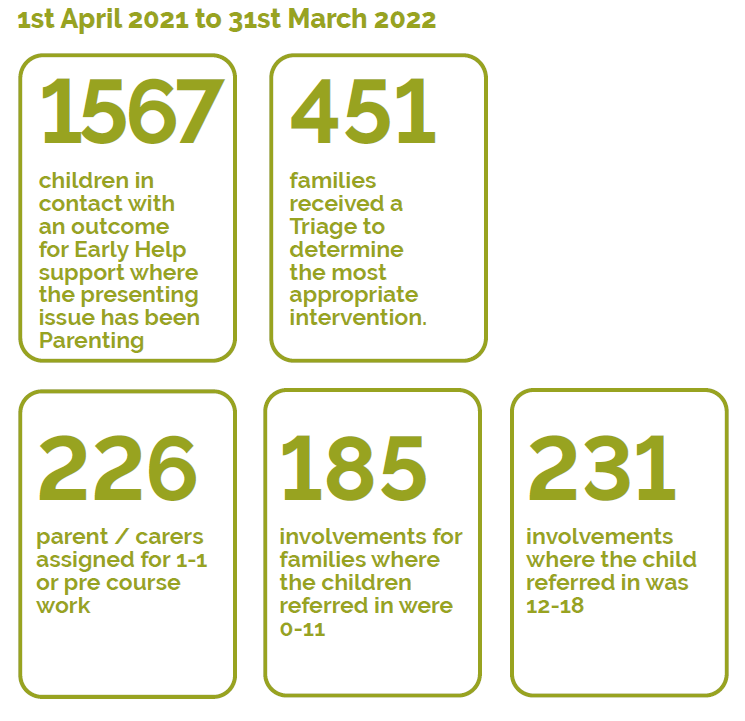
In 2021/22, 39 parents / carers have attended six weekly online group discussion sessions, and 23 parents / carers have completed Understanding Your Child with Additional Needs with group support.
Solihull Parenting Course
The Solihull Parenting course covers the following: Your child’s development, Understanding your child’s feelings, parenting styles, having fun together and Rhythm of interaction. Why sleep is important, Self-regulation and Anger, Different and types of communication, Looking back and forward.
During 2021/22, there were 808 learners who started the course, and 96% of course completers found the course helpful and 94% of course completers would recommend the course to others.
Senior Early Help Family Support Workers 11-19 Years
The role of the Senior Early Help Family Support Workers is to assess, identify and
coordinate family support and intervention, predominantly within Targeted Early Help Support.
The majority of the referrals involving young people relate to risk of family breakdown involving education issues including non-attendance, substance use, risk taking behaviour and mental health. Parental issues often involve mental health issues, substance use, domestic abuse, debts and financial management.
The aim of the Senior Early Help Family Support Workers is to provide a time limited targeted intervention in order to equip families with the necessary advice, skills and support to make positive decisions regarding their family.
During 2021/22, 241 adults and children Early Help Assessments were completed, and 244 adult and children domestic abuse routine enquiries were completed.
The scores improved for all 10 outcomes but improved the most for wellbeing, meeting emotional needs, social networks, boundaries and behaviour, and home and money.
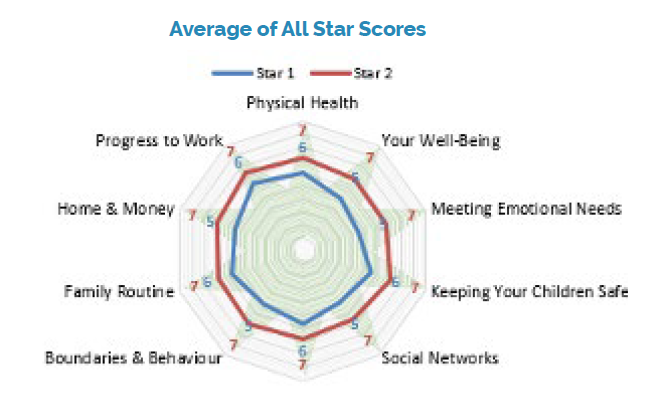
Youth Development Service
The Youth Development Service works with young people aged 10-19 and up to 24 years for those with disabilities and or learning needs and is part of the Early Help Offer which aims to prevent the need for support from specialist services.
There are a range of services available including one-to-one work, small group work, large group work, outreach work, the Hull Young Carers Project, and a range of services supporting young people’s emotional wellbeing (Turn 2 Us, Smile and Emotional Resilience Coaches).
In 2021/22, 3,073 individual young people received a service with 14,078 attendances.
Voice and Influence
There are a range of opportunities for young people to lead change and make key decisions in Hull. with further details in the Hull Early Help Service Guide and Performance Review 2021/22.
Targeted Youth Support
The Targeted Youth Support Service provides early help and support to young people and their families to help them achieve their potential and make a positive transition to independent living. Working as part of Hull City Councils young person’s accommodation hub, services are delivered in partnership between Children and Young Peoples Services and the Neighbourhoods and Housing Service.
Young people working with the service can also access wider co-located young people’s services and wider community and voluntary partners to make sure any support needs can be provided with a multi-agency response where required.
During 2021/22, there were 5,120 presentations to the service. A total of 4,291 presentations were related to housing or homelessness, and 883 individual young people approached the service with a total of 528 individual homeless presentations.
There were 282 personalised housing plans delivered, 168 successful medication to prevent homelessness cases, 243 cases were advice was given that prevented further mediation, and 73 cases returned to home with support in place to prevent homelessness with a plan to move on.
A total of 25 completed an Independent Living Skills (ILS) booklet with a view to accessing independent accommodation, 19 required emergency or same day hostel or supported accommodation and 355 were given other housing, financial, emotional wellbeing or other general advice or signposting.
A total of 78 young people accessed the Passport to a Property course, and 276 Independent Living Skills sessions have been delivered during 2021/22.
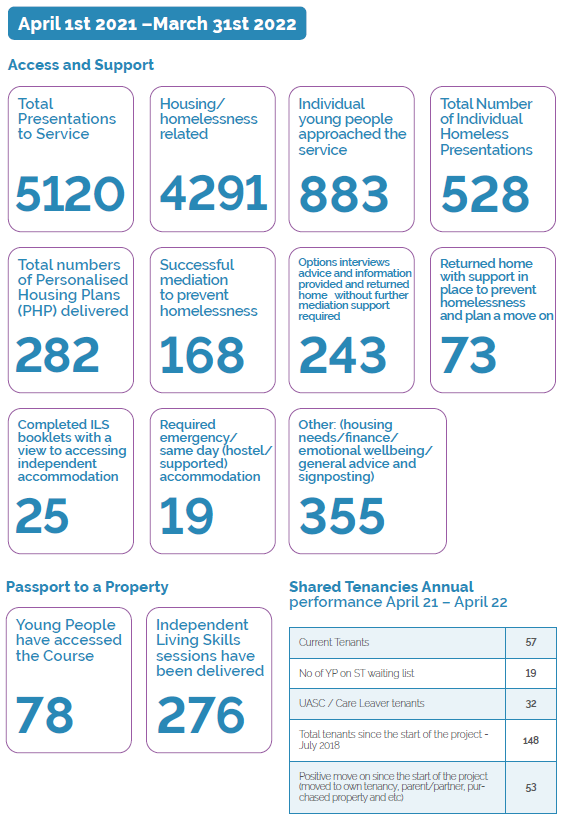
ReFRESH
ReFRESH provide a voluntary and confidential support to young people aged 11-18 years regarding drugs and alcohol. During 2021/22, 497 young people received a brief intervention, 174 a targeted intervention and 110 received treatment.
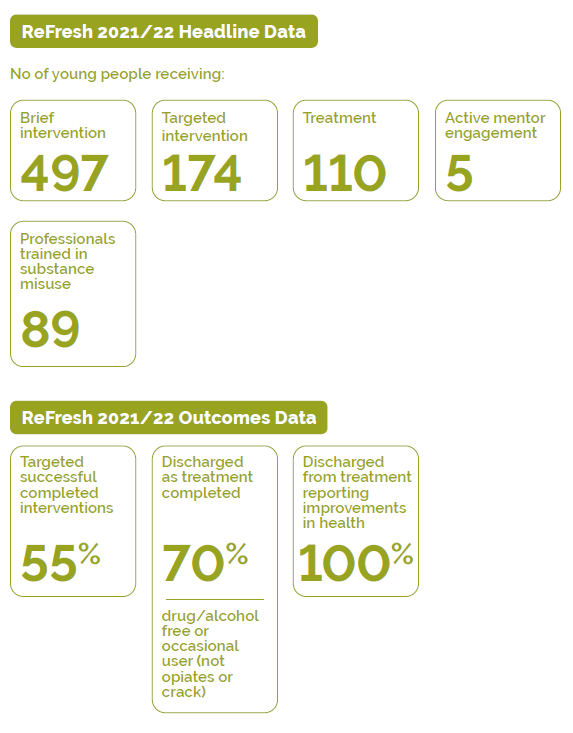
Thrive Hull
HeadStart Hull came to its natural end during 2021/22 period following an extension of funding for a year from the Big Lottery Community Fund due to the coronavirus pandemic. Much of the HeadStart Hull programme is continuing to be offered and delivered in the City, with the learning and best practice going on to influence the national policies and priorities for children and young people emotional wellbeing and mental health.
The Early Help and Prevention delivery model contributes to the Thrive Hull offer, and works closely with specialist mental health services, education, health, care and the voluntary and community sector.
Thrive Hull is underpinned by the i-Thrive framework for system change which has been developed by a collaboration between the Anna Freud National Centre for Children and Families and the Tavistock and Portman NHS Foundation Trust.
It conceptualises need in five categories: Thriving, Getting Advice and Signposting, Getting Help, Getting More Help and Getting Risk Support. Emphasis is placed on prevention and also the promotion of mental health and emotional wellbeing across the whole population. Children, young people and their families are empowered through active involvement in decisions about their care through shared decision making, which
is fundamental to the approach
The programme is working with all schools across the city (primary, secondary, special
schools and pupil referral units) as well as a range of community providers e.g. youth services, Voluntary & Community Sector (VCS), social care, health etc. to provide a city wide approach to improving emotional well-being outcomes.

Over 48,000 young people have been directly involved in universal support from HeadStart Hull since 2016 with 26,658 young people taking up additional support, 6,521 recruited to the additional support, and 6,786 actually taking up the additional support.
There have been 3,522 young people having completed targeted interventions, 1,149 parent or carers completing the programme element in a planned way and 1,952 professional supported as part of the HeadStart Hull programme since 2016.
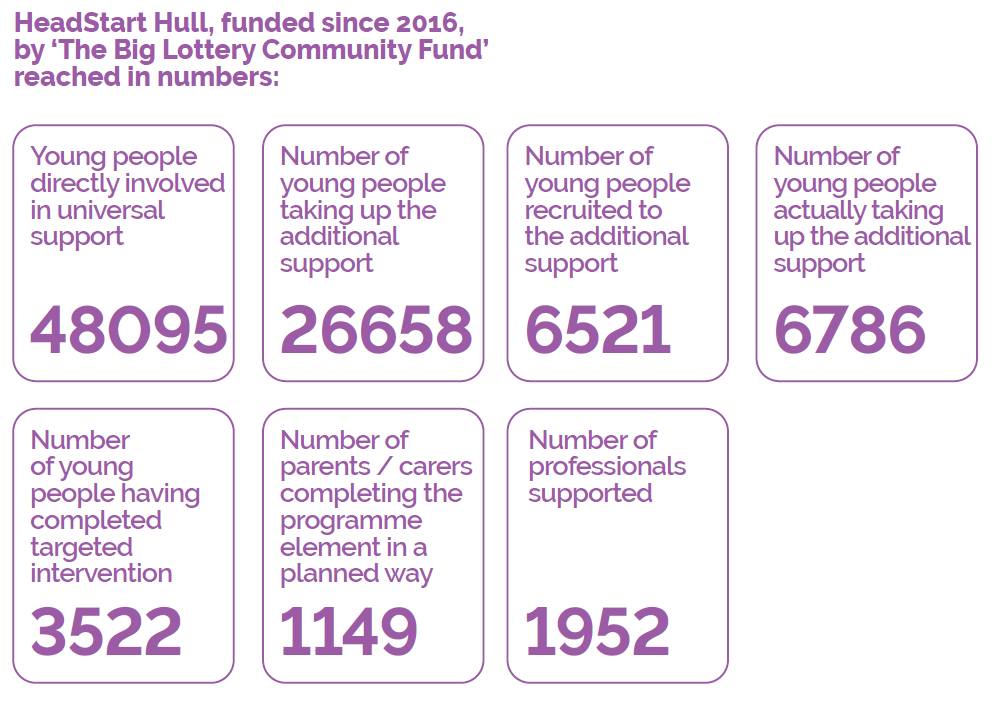
Family Group Conferencing
Family Group Conferencing offers support for young people and their families to make decisions and plans that affect them, this could be around contact or keeping a child safe. Between 1 April 2021 and 31 March 2022, there were 42 referrals into the service for 105 children.
Building Better Opportunities
What we do: Building Better Opportunities is funded by the Big Lottery Community Fund and the European Social Fund. The programme aims to help those who are unemployed and economically inactive people 25+, tackle poverty and social exclusion. The programme aims to improve the lives of local participants by increasing their employability skills, self-confidence, local knowledge, community engagement and
access to learning.
A total of 1,850 people have been supported since the project started in November 2016.
Careers and Enterprise Company – Career Hub Enterprise
This service facilitates and promotes the benefits of linking education and business together to improve local careers education for our young people. Working with the Careers and Enterprise Company the service delivers an Enterprise Co-ordination
function across the Hull and East Riding area. The Enterprise Co-ordinator is responsible for recruiting volunteer Enterprise Advisors from the local business
community.
This service now established, has formally become part of a Careers Hub. The Careers Hub offers more intensive support and sharing of good practice working towards achieving the Gatsby Benchmarks, which is a standard of good careers programme
across schools and colleges with the following eight Gatsby benchmarks:
- A stable careers programme
- Learning from career and labour market information
- Addressing the needs of each pupil
- Linking curriculum learning to careers
- Encounters with employers and employees
- Experiences of workplaces
- Encounters with further and higher education
- Personal guidance
The Enterprise Co-ordinator works with over 16 secondary schools / colleges and with over 16 senior business representatives, promoting and supporting improved careers education programmes across the local area.
There are 17 schools and colleges who are part of the Career Hub and linked to an Enterprise Advisor (36 if schools and colleges within East Riding of Yorkshire are added).
Connexions Service
The Connexions service helps the Local Authority to meet its statutory responsibility regarding the September Guarantee and Raising the Participation Age, ensuring every young person in year 11 and 12 has an offer of a place in education and training.
The services does this by working with young people to help them make a successful post 16 transition from year 11 into education and training. Connexions prioritises those in year 11 at risk of NEET (not in education, employment or training), including those with Early Help Care Plans (EHCPs) and children looked after. The services works face-to-face with young people in schools, academies, special schools, pupil referral units and with those who are home educated. Connexions advisers provide impartial one to one careers guidance and support to help young people make informed post 16 choices and prevent them from becoming NEET. Connexions advisers also help young people to make applications for education and training opportunities and provide follow up support to those young people needing further interventions to enable them to meet the duty to participate. The service works in partnership with schools and appropriate agencies to help address barriers to young people making a successful and sustainable transition post 16.
In addition to working with young people who are at risk of NEET, the Connexions service offers a traded service to Hull schools who wish to buy in additional careers guidance time for their cohort of students.
Between September 2020 and August 2021, there have been 1,727 career interviews completed with young people, 3,415 young people supported by Connexions with 620 pupil premium young people supported and approximately 260 young learners with Education, Health and Care Plans receiving funding from the high needs block to support their learning.
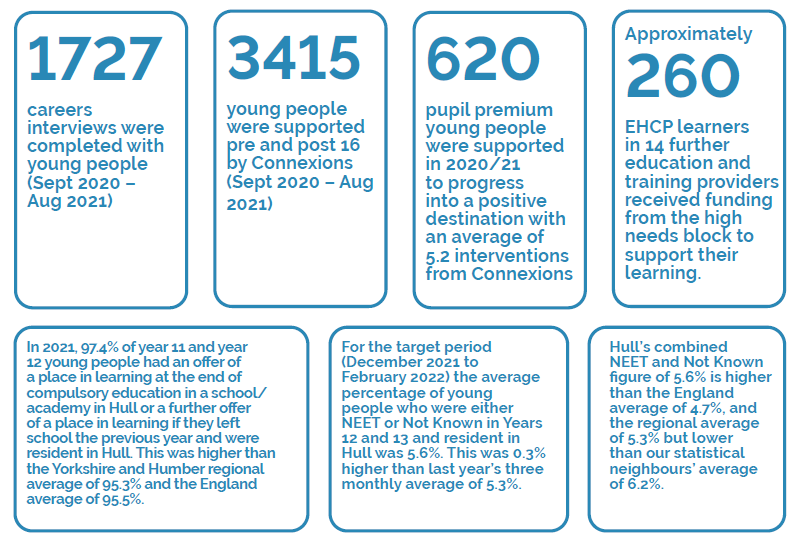
The Youth Hub – Hull
The Youth Hub Hull is part of the government’s response to COVID-19, in particular, the impact the virus has had on unemployment and isolation on young people. The hub has been operating since December 2020. The Youth Hub aims to support those age 16-29 years old back in to employment. The aims of the Youth Hub are to reduce unemployment rates in the local area and increase social inclusion. Those that access the hub must live in Hull or east riding and be unemployed. Every young person that comes through the Youth Hub are assessed by a Hull City Council Key Worker and from this a tailored support plan is created with the young person to help them move closer to employment and to support them to reduce down their barriers to work.
Since December 2020, more than 590 people have been supported by the Youth Hub project in Hull.
Springboard Project
Springboard (formerly the Springboard Youth Employment Initiative) is a partnership project, funded through the European Social Fund (ESF), which aims to help those aged 16-29 years old, who are NEET (not in employment, education or training) who live in Hull or the East Riding of Yorkshire. The service supports this client group to access learning or work through specialised support and training. The support includes providing progression pathways to apprenticeships, study programmes and traineeship programmes as well as employment, including self-employment.
Around 3,500 young people have been supported since the project began in 2016. Whilst not all have moved into employment, education or training, they have all moved closer to the labour market as a result of support.
Work Experience and Volunteering
In 2022, 194 work experience placements were offered to the 26 July 2022. Prior to the COVID-19 pandemic, there were 148 and 250 work placements in 2018 and 2019 respectively (and 71 in 2020 until placements stopped at the end of March due to the COVID-19 pandemic first lockdown).
Hull Youth Justice Service
Hull Youth Justice sits within the Early Help Provision in Hull and manages all children between the ages of 10-17 who have become involved in the Youth Criminal Justice System. The work of Hull Youth Justice brings together a multi-agency team which includes police officers, a probation officer, speech and language therapy services, a specialist public health nurse, specialists who help in relation to substance use, education, training and employment specialists, artists, chefs and skilled victim workers supporting those victims of crime.
Youth Justice staff will engage and listen to children and their families and carers to assess the risks, needs and strengths of the child to create a plan that will work to prevent or reduce youth crime and antisocial behaviour and keep children and the community safe. With a clear focus reducing offending/re-offending and on preventing
criminalisation of children, Youth justice Staff will complete recommended interventions with children looking at the consequences of their behaviour, emotional management and problem-solving skills taking a child first approach to engagement. The service also promotes and encourages the positive attributes of the child and develop basic life skills such as budgeting and healthy cooking.
Strategic Need and Service Provision
As a good education is very important for future health and wellbeing, it is essential that children are ready for school, and children and young people are able to maximise their achievements whilst at school, college and university, so that they can have good employment prospects. Children potentially requiring additional support should be assessed as quickly as possible as early help gives rise to better outcomes. Children with an Education and Health Care plan or in receipt of Special Educational Needs support need to have clear, comprehensive, integrated plans drawn up as soon as possible, with all professionals and the family working together to give the child the best possible care and support. There should also be promotion of physical and mental wellbeing across all educational settings.
Therefore it is essential that children and families requiring help can access the right help quickly. It is also imperative that service providers as part of their routine visits and child assessments seek out children and families who require help as not all those who require help will ask for help.
The Early Help and Prevention programme takes many forms from community support from family and friends, local businesses and community organisations; universal services such as nurseries; schools; GPs; midwives and Health Visitors, through to more targeted services. Some services will play a role in the provision of both a universal and targeted offer such as our Children’s Centres who provide a universal offer open to all but have a targeted approach through a referral based family support offer. The Police, Health Visitors and Youth Service also offer both universal and targeted support, using their universal offer to identify risk early and follow up with more targeted support where necessary. Some services will be specifically targeted to certain vulnerable groups such as young people and adults dealing with substance use, housing issues, or requiring mental health support etc. There are also targeted programmes in schools to improve children’s social and emotional skills and other issues. Evidence clearly shows that early intervention has the strongest impact during the first few years of life. It is also true that effective interventions can improve children’s life chances at any point during childhood and into adolescence.
Collaborative working between Early Help and Prevention services and children’s social care is crucial to support seamless transitions for families into and out of statutory child protection services, ensuring families receive the right support, in the right place and at the right time. In Hull, these relationships continue to develop and systems mature which ensure we prevent as many families as possible from entering or re-entering the safeguarding system.
The Early Help System is only effective if there is a truly integrated offer and partners work together to support children and families. Strong partnerships are a key feature of how we work in Hull and we will continue to build and develop these partnership arrangements for Early Help and work to improve our support for the communities of Hull.
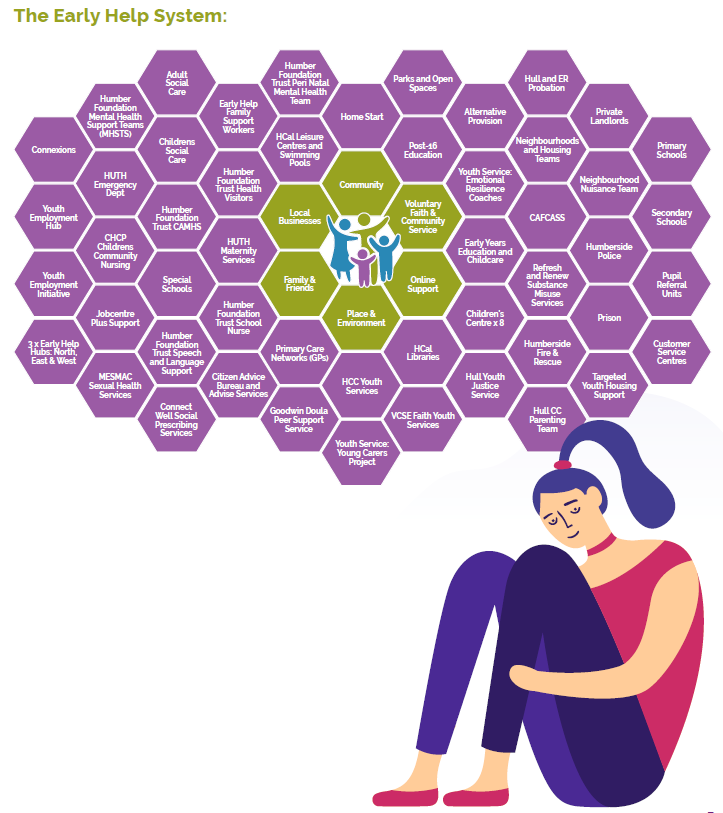
The Family Star Plus is the main assessment tool used by Early Help Family Support across Hull and is designed to support effective parenting.
The Family Star Plus is embedded in the Early Help Module in liquid logic, and gives great focus on the parent themselves as well as their parenting abilities, whilst ensuring we are listening to the voice of the child and maintaining a focus on what life is like for the child. The Family Star Plus covers ten areas of parenting essential to enabling children to thrive and in line with the UK Government’s Troubled Families initiative:
- Physical health
- Your well-being
- Meeting emotional needs
- Keeping your children safe
- Social networks
- Education and learning
- Boundaries and behaviour
- Family routine
- Home and money
- Progress to work
The work undertaken with the family will progress through them through the Journey of Change. The family support worker uses action planning, giving the parents SMART targets. These will be updated every 6 weeks, so that families can focus on small steps if necessary building up to focusing on end outcomes, such as getting a job or a home. Long-term, sustainable change is built by taking steps towards fundamental changes in attitudes, skills, motivation and behaviours. The Star helps us to evidence these changes.
The service also uses the My Star, Relationship Star, Attention Star and the Parent and Baby Star.
Early Help Children’s Centres are a core part of the Early Help Delivery Model across Hull. There are eight Children’s Centres across the city, three of which are the Early Help Locality Hubs. The eight centres provide a base for bringing together a range of practitioners supporting close collaboration and alignment of services to form an Early Help Team. All staff work with partners across the locality to deliver an integrated approach to Early Help services.
The Early Help service offer a wide range of support for children, young people and families in Hull, with children aged 0 to 11 years old. At any point and after this age, we work closely with other Early Help teams to ensure that the family receive support, if needed, at any point in the child’s life.
The Early Help Delivery model focuses on a programme of change of co-ordinated, cost-effective, timely and tailored support for children, young people and families.
This support ranges from Universal to Targeted support including:
- Family and parenting support utilising the Family Stars assessment and a range of evidence based tools.
- Parenting courses – Incredible Years, Family Links Nurturing, Triple P, HENRY.
- Play and learning sessions which are linked in the Early Years Foundation Stage Framework and are planned around measured outcomes for children.
- Infant massage classes which promote bonding and attachment, infant feeding, speech and language development and is also a great introduction into the services for families.
- Health Lifestyles support, sessions and advice including Us Mums exercise classes; Cooking on a Budget Courses; help to stop smoking; breastfeeding support and advice.
- Special Education Needs and Disability (SEND) family support, co-ordinating services for families, offering parenting advice.
- Child health clinics in conjunction with health visitors.
- Midwifery clinics are delivered from all of our centres.
- Home safety checks, advice and equipment.
- Help to find work or training through Youth Employment Initiative and Job Centre Plus.
- Volunteering, Education and Training.
- A place to meet other parents and carers, build up friendships and support networks.
This model of support reduces demand for specialist and acute services by using a joined up and evidence based approach to Early Help, resulting in improved outcomes and life chances for families through their needs being met earlier.
Resources
Marmot, M., Fair society, healthy lives: the Marmot review: strategic review of health inequalities in England post-2010. University College London Institute of Health: London, 2010.
A Bus, A.G., M.H. van IJzendoorn, and A.D. Pellegrini, Joint book reading makes for success in learning to read: a meta-analysis on intergenerational transmission of literacy. Review of Educational Research, 1995. 65(1): p. 1-21.
Lexmond, J. and R. Reeves, Building Character. 2009, Demos.: London.
National Institute for Health and Care Excellence, Social and emotional wellbeing for children and young people: Local government briefing. www.nice.org.uk. 2013, National Institute for Health and Care Excellence: London.
Bynner, J., Childhood risks and protective factors in social exclusion. 2001, London: Institute of Education.
Farrington, D., Explaining and preventing crime: the globalization of knowledge. 1999: The American Society of Criminology.
Utting, D., Suggestions for the UK: an overview of possible action.
Department for Education, Early years evidence pack: pack summarising evidence on achievement at the early years foundation stage. 2011, Department for Education: London.
Hull Early Help Service Guide and Performance Review 2021/22. Hull City Council, 2022.
Hull’s Early Help and Prevention Strategy 2021-25. https://www.hull.gov.uk/sites/hull/files/media/Hull%20Early%20Help%20and%20Prevention%20Strategy%202021-25.pdf
Updates
This page was last updated / checked on 27 September 2023.
This page is due to be updated / checked in April 2024.